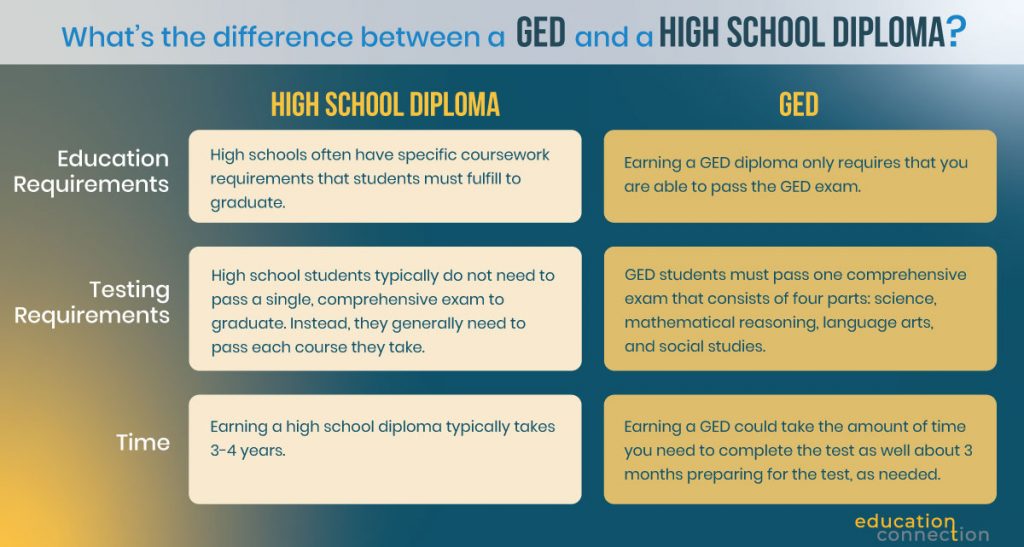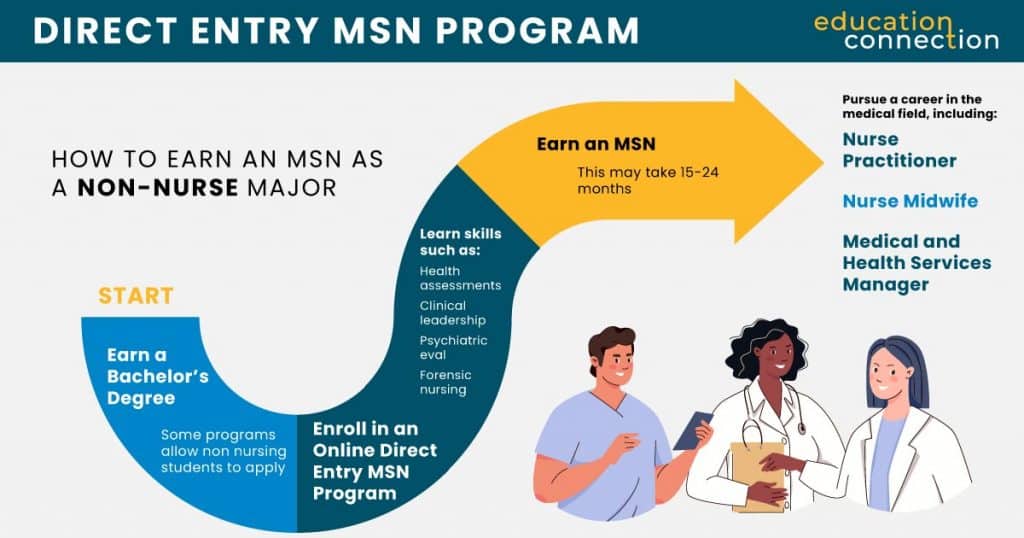Table of Contents
If you are one of the many students who want to go to college but don’t have a high school diploma or GED, you might feel as though your options are limited. However, some community colleges accept students without a high school diploma or GED, and some universities do as well. For those seeking vocational education, there are also trade schools that don’t require a high school diploma or GED.
This article provides you with information about how you might be able to attend college without a high school diploma or GED.
Find an Online Degree Program
What Is a GED?
You might have heard this term but wondered what it means—and what it might mean for you.
A GED, which stands for General Educational Development, is a credential that signifies the equivalent of a high school diploma in the United States and Canada. It is designed for individuals who did not complete their formal high school education but still wish to obtain a recognized qualification.
To earn a GED diploma, you must pass a test to show that you are proficient in the fundamental subject areas that students study in high school—math, science, social studies, and language arts. To prepare for the test, you could use study guides that are widely available or enroll in a GED program.
There are a number of GED programs available to help prepare you for the GED test. You can often take GED classes online, and you might even find free online GED courses. These programs typically last about 3 months, but the length may vary depending on your current proficiency in the areas covered on the test.
What’s the difference between a GED and a high school diploma?
- Educational requirements: High schools often have specific coursework requirements that students must fulfill to graduate. Earning a GED diploma required only that you are able to pass the GED test.
- Testing requirements: High school students often need to earn a particular grade to pass each course they take but are typically not necessarily required to take a single, comprehensive test to graduate. GED students must take one comprehensive test that consists of four parts, each focusing on a different area: mathematical reasoning, science, language arts, and social studies. Earning a diploma is contingent on passing the test.
- Time: Earning a high school diploma typically takes 3-4 years. Earning a GED could take the amount of time you need to complete the exam if you are already proficient in the subject areas covered. If not, you might spend about 3 months preparing for the test.
However, there are also similarities between a GED and high school diploma. You could take both GED and high school courses online. Both require you to be knowledgeable in a range of subject areas. And both might lead to greater career opportunities.

Can You Go to College Online without a GED or High School Diploma?
There may be options for you if you do not have a GED or high school diploma. Here are some possibilities:
- Apply as a non-traditional student. This option may be available at colleges that accept students without a GED or high school diploma. A non-traditional student is considered any adult who has not been enrolled in high school for more than 6 years. If you apply as a non-traditional student, you may have to submit other materials, such as letters of recommendation, test scores, and a personal statement.
- Enroll in a community college. Some community colleges accept students without a high school diploma or GED. You could take individual courses relevant to the career you wish to pursue or even complete your degree program. Many community colleges offer online classes. After completing courses or earning a degree at a community college,you may be able to use your academic records to transfer to a four-year college or university.
- Enroll as a lifelong student. A lifelong student is defined as a person who takes an individual class during a semester without the goal of earning a degree. Doing so might help you build skills and gain knowledge that could help you reach your career goals.
- Consider finishing high school while taking college classes online. There are some colleges that allow students to earn their diploma while beginning their college career.
If I Don’t Have a GED or High School Diploma, What Are College Admission Requirements?
The admission requirements will generally vary based on the school. Requirements might include:
- Meeting a minimum age requirement. Students typically have to be at least 18 years old. Some may be able to enroll at 16 years old if they also work toward earning their GED.
- Ability to enroll in remedial courses. These classes help students catch up on missed information.
- Providing proof of academic accomplishments. Students may submit reading lists or alternative education program results.
- Submitting a personal statement. This essay allows students to provide more information about their background and experience.
- Submitting standardized test scores. Adult students without a GED or high school diploma could take the SAT or ACT tests.
Am I Eligible for Financial Aid if I Don’t Have a GED or High School Diploma?
Many federal student loans are only available to students with a high school diploma or GED. However, there is a federal program called “Ability to Benefit” that could help you out.
What is this program all about? According to the U.S. Department of Education, Ability to Benefit is an educational law. It was amended in 2015 and now allows for qualifying students without a high school diploma or GED to be eligible for Title IV funding. The law was amended in order to help more students enroll in college.
The eligibility requirements typically include:
- Being enrolled in a program that receives Title IV funding. These are typically career pathways programs.
- Passing the Ability to Benefit exam.
- Completing six credits that could be applied toward a degree program.
Students without a diploma or GED may also have additional options for financial aid. If you do not have a GED or high school diploma, you may want to reach out to local non-profit organizations and private companies that offer scholarships to qualifying applicants.
Colleges That Don’t Require a GED or High School Diploma?
There are colleges and universities across the country that do not require a GED or high school diploma. Here are some of them.
Note that this is not a complete list—there may be other schools that will accept you if you don’t have a high school or GED diploma.
Now that you know you have options, why not take the next step toward getting an education? To learn more about colleges and universities that don’t require a high school or GED diploma, contact us today!
FAQs
1. Are there colleges that accept students without a high school diploma or GED? Yes, some community colleges and universities accept students without a high school diploma or GED. Additionally, trade schools that offer vocational education may also admit students without these credentials.
2. What is a GED and how can I obtain it?
A GED (General Educational Development) is a credential that signifies the equivalent of a high school diploma. It is designed for individuals who did not complete their formal high school education but wish to obtain a recognized qualification.
3. How can I earn my GED diploma?
To earn a GED diploma, you must pass a test that assesses your proficiency in math, science, social studies, and language arts.
4. What is the difference between a GED and a high school diploma?
The main differences include educational requirements, testing requirements, and the time it takes to earn the credentials. High school diplomas often have specific coursework requirements, while a GED only requires passing the GED test. High school students typically need to pass individual courses, while GED students must pass one comprehensive test. Earning a high school diploma usually takes 3-4 years, whereas the time to prepare for and complete the GED test may vary but could be around 3 months.
5. Can you attend college online without a GED or high school diploma?
There may be options available. You can apply as a non-traditional student at colleges that accept students without a GED or high school diploma. Community colleges may also admit students without these credentials, allowing them to pursue individual courses or complete a degree program. Additionally, you could enroll as a lifelong student to take classes without aiming for a degree. Some colleges even offer programs that allow you to earn your high school diploma while beginning your college career.
6. What are the admission requirements for college without a GED or high school diploma?
Admission requirements vary, but they could include meeting a minimum age requirement, enrolling in remedial courses, providing proof of academic accomplishments, submitting a personal statement, and submitting standardized test scores such as the SAT or ACT for adult students.
7. Am I eligible for financial aid without a GED or high school diploma?
Many federal student loans require a high school diploma or GED, but there is a federal program called “Ability to Benefit” that may provide assistance.
8. Which colleges and universities do not require a GED or high school diploma?
There are various colleges and universities across the country that do not require a GED or high school diploma. The article provides sponsored listings of some of these institutions.
This is an offer for educational opportunities that may lead to employment and not an offer for nor a guarantee of employment. Students should consult with a representative from the school they select to learn more about career opportunities in that field. Program outcomes vary according to each institution’s specific program curriculum.


















